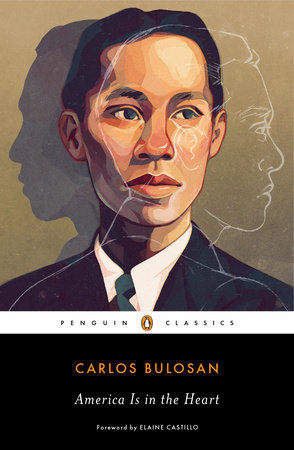By Heejoo Park

So, where do I begin to review a seminal work such as Carlos Bulosan’s America Is in the Heart (1943)?
When I got my hands on an advanced review copy of the Penguin Classics edition, I had recently finished reading AIH in preparation for my PhD exam. The library copy I had borrowed for that occasion was heavily underlined and annotated, which I did not mind at all as it was fascinating to see another reader’s thought process. However, I was excited for this new edition as the publishers have found the best possible contemporary authors – in my opinion – to write the introduction for AIH (Elaine Castillo), Younghill Kang’s East Goes West (Alexander Chee) and John Okada’s No-No Boy (Karen Tei Yamashita). Regarding No-No Boy, however, I do have to mention the dispute over its copyright. As Prof. Shawn Wong reminds us, “The publishing history of the book is almost important as the book itself.” As of now, the University of Washington Press edition of No-No Boy remains the only one with the approval of the Okada estate. For those of you who are interested: 2014 UWP edition includes a foreword by yet another brilliant writer, Ruth Ozeki. The foreword is beautifully written and reminds me so much of Ozeki’s own novel, A Tale for the Time Being.
By way of returning to the discussion of America Is in the Heart, I offer a question posed by Castillo: “Do you remember how old you were when you first read a book that had a character who looked and lived like you in it?” Sometime during May a.k.a. Asian American and Pacific Islander Heritage Month of this year, I also came across an article that asked a similar question: “Who was the first Asian American author you have read?” Surprisingly, it took me a while to come up with answers.
As an Asian Americanist, I often think about the significance of those questions. Having been born and raised in South Korea, I did not have to search hard to find images of myself in Korean literature. Even when I was first transplanted to California at a pre-teen age, I was lucky enough to be introduced to children’s books by Asian American authors such as Laurence Yep and Linda Sue Park. At the time, I did not realize the significance of such lucky literary encounters. However, as an adult, I am both shocked by the lack of BIPOC representation in children’s literature and thrilled by the work of writers who are trying to remedy it. A book that I recently reviewed, Erin Entrada Kelly’s Lalani of the Distant Sea (2019), for instance, is a wonderful new addition to Filipino American children’s literature.
Even with all the reading privilege I had growing up, I can never forget what a life changing experience for me it was to encounter a book such as Susan Choi’s The Foreign Student (1998) in the American college classroom. For Castillo, Bulosan’s America Is in the Heart was THAT book. Yet, to love a book does not mean that you accept it without any criticism, Castillo says: “As a Filipinx writer, I know well that I’m one of Bulosan’s many children; it’s fact that I cherish with my whole heart. I also know that to be part of a family also often means having to fight – and that fighting with your family is sometimes a way of fighting for them.” The title of Castillo’s own debut novel, America is Not in the Heart (2018), perfectly reflects that complexity.
As many critics have noted, America Is in the Heart is a book full of doubles / pairs. What I was fascinated by this time around, however, was how those doubles are in a sort of risqué pas de deaux with one another. The protagonist Allos is not quite Carlos, the author himself, though there are identifiable similarities. Spanish colonialism seems at first to paint American colonialism in a more positive light and yet the tragic events that befall Allos in U.S. suggest otherwise. Filipino bachelors find affinity with Mexican Americans in the migrant farm worker communities. However, that opportunity for cross-ethnic solidarity is marred by the bachelors’ sexual abuse of Native and Mexican American women. As a writer and a character, Carlos /Allos witnesses how the hypersexualization and criminalization of Filipinos result in those men turning into drunkards, gamblers, and womanizers, thereby reinforcing the devastating stereotypes. While there is immense hope for what the America could be for Allos and his community in the novel, there is also despair at how that future may never be realized.
I’ve pointed out all these in random order to simply say, Bulosan’s America is in the Heart is a work that is worth revisiting not just for its status as an Asian American literary canon but also as a reminder that we still are struggling with those tensions in our contemporary moment. Confronting those tensions may make us feel uncomfortable, but this is precisely why we need to do so. Of all my recent book reviews, this was by far the most difficult to find a place to begin and end. So by way of thanking anyone who has spent time with my meandering thoughts, I offer Matthew Salesses’ reading of AIH!
Review Author: Heejoo Park, PhD Candidate in English hpark@ucr.edu
Buy the Book Here: https://www.penguinrandomhouse.com/books/600643/america-is-in-the-heart-by-carlos-bulosan-foreword-by-elaine-castillo/